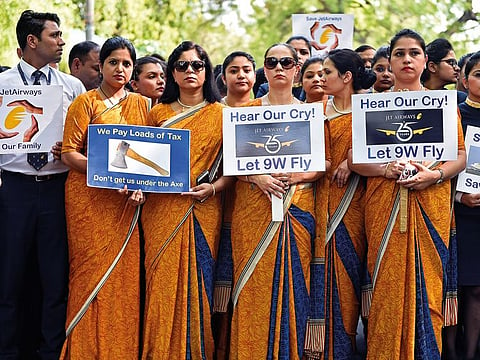More challenges ahead for Jet Airways
Analysts say Etihad Airways could look at other opportunities away from Jet

Dubai: The Indian travel market has long been described as one of the most lucrative in the world, but even that may not be enough to save crisis-hit Jet Airways.
The Indian airline, burdened by over $1 billion (Dh3.67 billion) in debt, recently opened bids to investors, allowing them to own stakes in it. Abu Dhabi-based Etihad Airways, which already owns a 24 per cent stake in Jet, is said to be one of the investors bidding for more shares. But analysts say there are still challenges ahead, even as Jet attempts to restructure.
“The market offers enormous growth potential but it is extremely price sensitive and competition is intense. On top of this, airport and infrastructure [are] heavily constrained and fuel is made more expensive by a tax levy,” said John Strickland, director at London-based JLS Consulting.
The Indian market is lucrative, yes, but it’s also extraordinarily difficult to be profitable there. For foreign investors, there will be limited appeal [in Jet’s stakes].Andrew Charlton | Managing director of Aviation Advocacy
For Jet Airways, competition has taken a big toll.
After establishing itself as a key player in the Indian aviation industry for many years, the rise of low-cost carriers such as SpiceJet and IndiGo in the early 2000s hurt Jet, as passengers opted for cheaper flights rather than Jet’s full-service offering.
Foreign carriers also presented competition to Jet on international routes. Then, in 2018, a plunge in the value of the Indian rupee added to Jet’s woes, as flying became more expensive for Indians and so did fuel prices for Jet.
Still, Indian media reports say that Jet is waiting for investors such as Etihad Airways to step in and back it. Etihad, which is already dealing with its own challenges after racking up about $4.7 billion in losses over the past three years, said it is still standing by Jet, but analysts say that may not be the best decision.
“The Indian market is extremely important to [Etihad] but it hasn’t seen a return on its existing investment, and the relationship between management of the two airlines has been fraught,” JLS’s Strickland told Gulf News. “It may look to pursue other options to strengthen its position in India.”
Others said that for Etihad, its existing stake is enough to capitalise on opportunities in the Indian market.
Andrew Charlton, managing director of Aviation Advocacy in Switzerland, said there’s arguably no difference for Etihad between owning 24 per cent and, say, 49 per cent.
“The Indian market is lucrative, yes, but it’s also extraordinarily difficult to be profitable there. For foreign investors, there will be limited appeal [in Jet’s stakes] while the Indian policy is so opposed to foreign investment,” he said.
Charlton also pointed that challenges in the Indian market come even as demand for travel outstrips supply.
“The Indian market has been exceptionally brutal on private international airlines. Kingfisher collapsed, Jet collapsed, Air India is propped up by the Indian government – it seems to be a very difficult market to survive in,” he said.
Kingfisher Airline, which was founded by the now-embattled Indian tycoon Vijay Mallya, suspended all operations in 2012, and Indian experts are now drawing comparisons between Kingfisher and Jet.
The latest statement from Jet said that all domestic flights are temporarily suspended, after international flights were stopped. The carrier’s management is still in talks with both lenders and potential investors, but has so far not reached any conclusions.
As for Etihad, it said it is still working with Jet’s management, but refused to confirm whether or not it will buy more shares.



